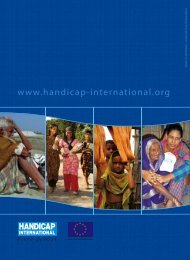Full page photo print - Harvard Law School Project on Disability
Full page photo print - Harvard Law School Project on Disability
Full page photo print - Harvard Law School Project on Disability
You also want an ePaper? Increase the reach of your titles
YUMPU automatically turns print PDFs into web optimized ePapers that Google loves.
n<strong>on</strong>binding: A document, like a declarati<strong>on</strong>, that carries no formal legal obligati<strong>on</strong>s. It may,<br />
however, carry moral obligati<strong>on</strong>s or attain the force of law as customary internati<strong>on</strong>al law.<br />
n<strong>on</strong>governmental organizati<strong>on</strong> (nGo): An organizati<strong>on</strong> formed by people outside of<br />
government. NGOs m<strong>on</strong>itor the proceedings of human rights bodies such as the Human<br />
Rights Committee. Some are large and internati<strong>on</strong>al (e.g., the Red Cross/Crescent, Amnesty<br />
Internati<strong>on</strong>al, the Scouts); others may be small and local (e.g., an organizati<strong>on</strong> to advocate<br />
for people with a particular kind of disability in a particular city). NGOs play a major role in<br />
influencing UN policy; many of them have official c<strong>on</strong>sultative status at the UN.<br />
Office of the High Commissi<strong>on</strong>er for Human Rights (OHCHR): An office of the United<br />
Nati<strong>on</strong>s Secretariat mandated to promote and protect all rights established in internati<strong>on</strong>al<br />
human rights laws and treaties. Located in Geneva, the OHCHR works to prevent human<br />
rights violati<strong>on</strong>s, secure respect for all human rights, promote internati<strong>on</strong>al cooperati<strong>on</strong> to<br />
protect human rights, and coordinate related activities throughout the United Nati<strong>on</strong>s.<br />
protocol: A treaty which relates to or modifies another treaty (e.g., adding additi<strong>on</strong>al<br />
procedures or substantive provisi<strong>on</strong>s); Called an “opti<strong>on</strong>al protocol” because a government<br />
that has ratified the original treaty can choose whether or not to ratify the changes made in the<br />
protocol.<br />
positive discriminati<strong>on</strong>: See affirmative acti<strong>on</strong>.<br />
protect human rights: The obligati<strong>on</strong> to “protect” human rights means that the State is required<br />
to protect every<strong>on</strong>e, including people with disabilities, against abuses by n<strong>on</strong>-State actors,<br />
such as individuals, businesses, instituti<strong>on</strong>s, or other private organizati<strong>on</strong>s.<br />
Ratificati<strong>on</strong>, Ratify: Process by which the legislative body of a state c<strong>on</strong>firms a government’s<br />
acti<strong>on</strong> in signing a treaty; formal procedure by which a state becomes bound to a treaty after<br />
acceptance.<br />
Reas<strong>on</strong>able accommodati<strong>on</strong>: Necessary and appropriate modificati<strong>on</strong>s or adjustment to<br />
a practice, program, or physical envir<strong>on</strong>ment so that it is accessible, appropriate, and usable<br />
for a pers<strong>on</strong> with disabilities <strong>on</strong> an equal basis with others. Under US law such modificati<strong>on</strong>s<br />
should not involve “undue hardship” <strong>on</strong> the pers<strong>on</strong> or entity required to provide it.<br />
Rehabilitati<strong>on</strong>: Effective and appropriate measures aimed at helping people attain and<br />
maintain maximum independence, full physical, mental, social and vocati<strong>on</strong>al ability and<br />
full inclusi<strong>on</strong> and participati<strong>on</strong> in all aspects of life as a result of acquiring a disability or a<br />
change in <strong>on</strong>e’s disability or circumstances. By c<strong>on</strong>trast, habilitati<strong>on</strong> refers to helping people<br />
who are born with a disability or acquire <strong>on</strong>e at an early age attain and maintain maximum<br />
independence and full inclusi<strong>on</strong>.<br />
Respect for human rights: The obligati<strong>on</strong> to “respect” human rights means that States must<br />
not interfere with the exercise and enjoyment of the rights of people with disabilities. They<br />
must refrain from any acti<strong>on</strong> that violates human rights. They must also eliminate laws,<br />
policies and practices that are c<strong>on</strong>trary to human rights.<br />
Reverse discriminati<strong>on</strong>: See affirmative acti<strong>on</strong>.<br />
signing, sign: In human rights the first step in ratificati<strong>on</strong> of a treaty; to sign a C<strong>on</strong>venti<strong>on</strong>, or<br />
<strong>on</strong>e of the Covenants c<strong>on</strong>stitutes a promise to refrain from undermining the principles in the<br />
document and to h<strong>on</strong>or its spirit.<br />
304 HumAn RIGHts. yes! ActI<strong>on</strong> AnD ADvocAcy <strong>on</strong> tHe RIGHts oF peRs<strong>on</strong>s wItH DIsAbIlItIes




